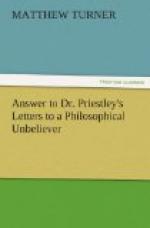In mentioning that doubts arose by reading your very Letters, which were written to eradicate all doubts, let me not accuse you of being unequal to the task assumed. I mean no such charge. You have in my opinion been fully equal to the discussion, and have bandied the argument ably, pleasingly and politely. I am certain from the extracts you have made from Dr. Clarke, the first of other Divines, I should have been converted from my superstition by his reasoning, even without perusal of an answer: I pay you however the compliment of having only brought me to doubt, and I find I am not the only person who have been led to disbelieve by reading books expressly written to confirm the Believer. Stackhouse’s Comment upon the Bible, and Leland’s View of Deistical Writers have perhaps made as many renegado’s in this country as all the allurements of Mahometanism has in others. What can be said to this? They were both undoubtedly men of abilities, and meant well to the cause they had to support. All that I shall observe upon the matter is, that what cannot bear discussion cannot be true. Reasoning in other sciences is the way to arrive at truth: the learned for a while may differ, but argument at last finds its force, and the controversy usually ends in general conviction. Reasoning upon the science of divinity will equally have its weight, and all men of letters would long ago have got rid of all superstitious notions of a Deity, but that men of letters are frequently men of weak nerves; such as Dr. Johnson is well known to be, that great triumph to religionists; it requires courage as well as sense to break the shackles of a pious education; but if merely a resolve to reason upon their force can break them, what can we observe in conclusion but
"Magnus est veritas et prevalebit."
That religion or belief of a Deity cannot bear the force of argument is well known by Divines in general, is manifest by their annexing an idea of reproach to the very term of arguing upon the subject. These arguers they call Free-thinkers, and this appellation has obtained, in the understanding of pious believers, the most odious disgrace. Yet we cannot argue without thinking; nor can we either think or argue to any purpose without freedom. Therefore free-thinking, so far from being a disgrace, is a virtue, a most commendable quality. How absurd, and how cruel it is in the professors of divinity, to address the understanding of men on the subject of their belief, and to upbraid those very men who shall exercise their understanding in attending to their arguments! No tyranny is greater than that of ecclesiastics. These chain down our very ideas, other tyrants only confine our limbs. They invite us to the argument, yet damn us to eternal punishment for the use of reason on the subject. They give to man an essence distinct from his corporeal appearance and this they call his soul, a very ray and particle of the Divine Being;




